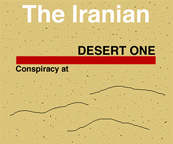
Conspiracy at Desert One
A novel
By Bernace Charles
The Iranian
Chapter Twelve
1979 Mid December
In Istanbul, Laleh Sanders walked along Mesrutiyet Caddesi and thought
about her meeting with the young man from Tehran. She wondered if he were
trustworthy. The student revolutionaries in Tehran were revealing America's
deep infrastructures imbedded in the Shah's government. If the young operative
were a revolutionary informer, she would have no way of knowing it. Yet,
Fred was willing to rely on Mustafa Liddell to obtain the intelligence
details on the embassy compound. If the agency or the military were planning
a rescue-effort, the information would be critical. Depending on a contact
the agency never used seemed less than hopeful. There was also the possibility
of lulling someone into a trap. The agency's recklessness or desperation
seemed out of the question. Laleh didn't understand it.
Then turning her attention to the boulevard, Laleh's thoughts drifted
through some of Istanbul's history.
***
In Tehran a cold morning lay calm as if waiting for some needed pronouncement
to wake it other than a call to prayer. No crowds were before the American
Embassy Compound. Not all were falling into the mold of Ayatollah Khomeini's
movement. As Sophia Liddell walked along Roosevelt Avenue, she wore the
hijab. She thought of how the street carried an American President's name.
The American President came to the city for a conference with Churchill
and Stalin during the Second World War. The West once supplied Russia through
the Persian Corridor to prevent Nazi Germany from invading Iran for its
oil and now the West was The Great Satan.
As Sophia Liddell walked an avenue once kept clean, the wide street
now seemed dirty to her. Countless pamphlets from the past day blew about
it in a brisk, December wind. The past day, the chorus of "Death to
the Americans" rolled across the compound as a great noise and moving
by its own will.
Now, the street was quiet. While surveying the compound's wall and the
occasional student guard standing before it, Sophia wondered at the insanity
gripping the city. Once the revolution settled, she wondered if there would
be anything left but the hardness of life. It was the hardness interpreted
by those driving the revolution. The brittle lack of compromise took hold
after Khomeini returned from France and first went to Tehran's Behesht-e
Zahra cemetery to speak in honor of those already giving their lives for
the revolution.
In the cold, the radical Islamic clerics and Inmans were teaching their
zeal. They were destroying all hope for the individual. With this taking
place, Mustafa was in Istanbul, meeting with an American contact of the
agency that once trained SAVAK agents. Though Sophia was certain the past
days of terror weren't going to outnumber the future, she knew she held
no interest in politics. Executions were taking place outside secret revolutionary
courts where men quickly dispatched those judged.
Somewhere the forgiveness of Allah got lost and the revolution was turning
on itself. As she walked, Sophia thought of the fact she was fortunate
to be alive since an American held in the American Compound was one she
dated. He was an American Marine guarding the Embassy and she now wondered
if he was still alive. The young man took her to the Hilton Club before
the revolution saw to its closing. Now, students were taking over the hotels
as western nationals left the city. Discotheques were no longer part of
Tehran's nightlife. Two weeks earlier girl friends took her before a neighborhood
Inman where she denounced the western ways, affirmed her return to Islam,
and put on the hijab.
A woman passing her said, "Praise Allah, and praise Ayatollah Ruhollah
Khomeini our A'alam." The woman also wore the Islamic dress exposing
only her hands and feet. She didn't stop for conversation. Now, everyone
was afraid of talking to anyone he or she didn't know. It took only a single
accusation to bring a person before the revolutionary tribunals or Inmans
and charged with defying Islamic law. The fight against the great Satan
of America spilled out of the major avenues to reach into individual neighborhoods.
In her walk, Sophia mentally tallied the number of guards along Roosevelt
Avenue. At the end of the block, she turned to her left. She walked the
embassy perimeter four times the last two weeks and no one stopped her.
Though the zeal for the revolution was still in the air, it tapered off
unless cameras of the western media turned to it. Three weeks earlier Sophia
was a student at Tehran University. As in the streets, the revolution filled
the university, and she knew most were students of the Marxist-Leninist
group. She knew one young man who studied in Moscow. Now, she was helping
her brother by counting the guards around the American compound.
After Sophia viewed the compound wall off Takht-e Kamshid, she turned
to return the direction of The Iran Carpet Company. The Little Import Company
sat across from it.
Reaching Ferdowsi Avenue, Sophia crossed to enter a building now owned
by the state. Thankful to be out of the November cold, she climbed stairs
to the second floor to enter the office of Liddell Imports. As she entered,
she said a private prayer for Mustafa's safe return from Istanbul >>>
Go to Chapter Thirteen
* Back
to "Conspiracy at Desert One" main index


![]()